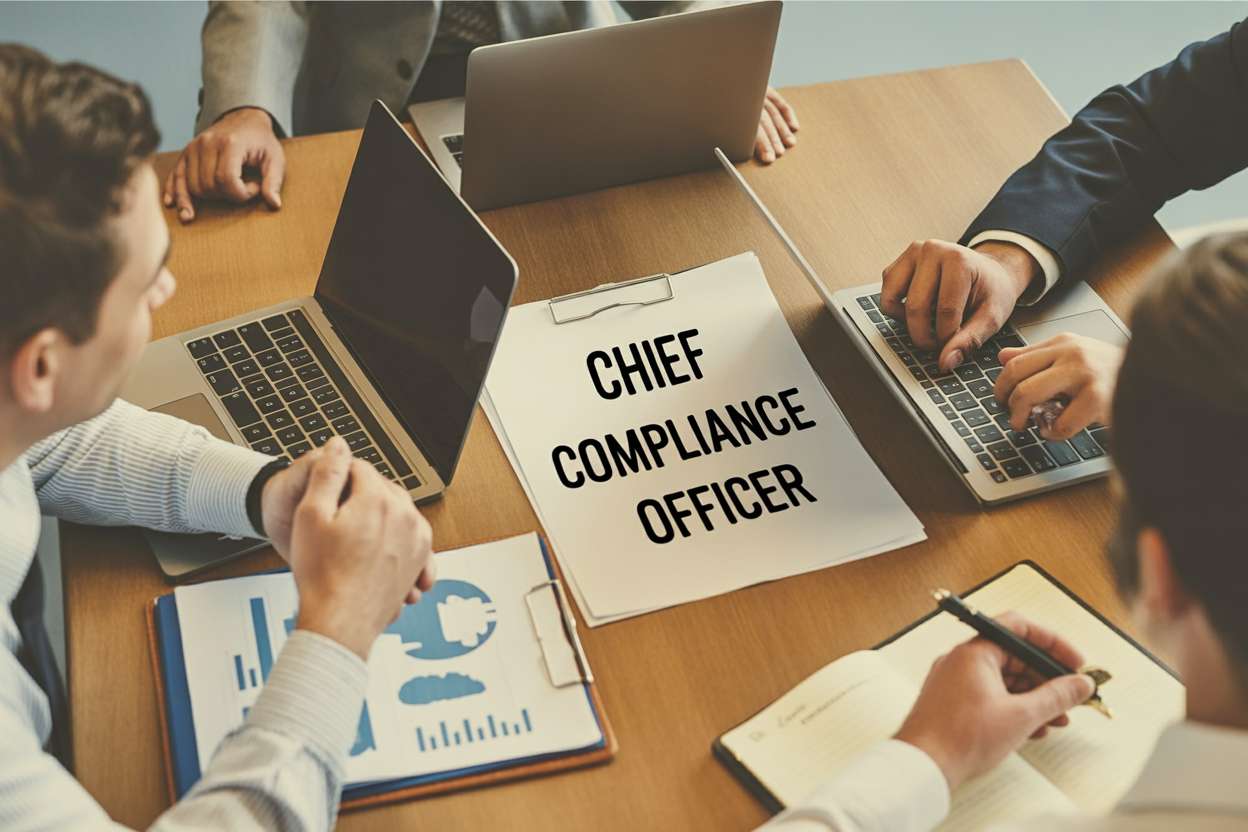FinTech founders wake up every day thinking about user acquisition, feature releases, maybe that Series A pitch deck that's been consuming their thoughts for weeks, but somewhere in the back of their minds there's this nagging worry about compliance that feels like having a small stone in your shoe that you can ignore for a while until eventually it becomes all you can think about because it just won't go away.
The regulatory reality that these companies face is pretty straightforward when you actually look at it, though most people would rather not. If you're a registered investment adviser, SEC Rule 206(4)-7 doesn't care about your runway or your product roadmap or how brilliant your technology might be, because it mandates that you have a Chief Compliance Officer and that's not a suggestion or something you can put off until later when you have more money or time. Hiring a CCO ends up costing somewhere between $150,000 and $250,000 per year for someone with actual experience who won't just create more problems than they solve, which for a startup that maybe raised $2 million in seed funding represents this terrifying math where you could blow through 15% of your runway just on one person who doesn't write code or sell your product or do anything that directly generates revenue.
Most founders end up getting stuck in this weird limbo where they know they need compliance because the alternative is getting destroyed by regulators who seem to take particular pleasure in making examples out of innovative companies, but the traditional solution might actually kill their company before it even gets started because startup compliance costs have become this existential threat that nobody talks about in those glossy "disrupt everything" articles that make entrepreneurship sound so glamorous and easy.
There's another way to think about this problem that's been gaining traction among companies that have managed to figure out how to balance growth with governance, and it involves recognizing that compliance doesn't have to be this massive fixed cost that drains your bank account and slows down every decision you want to make. The AI-powered fractional CCO model has started changing how smart companies handle this challenge, and it might actually work better than the old way of throwing money at the problem until it goes away. Let’s find out why and how it might work.
The Traditional Solution: What is a Fractional CCO?

Fractional executives have been around for years in various forms, though they've really gained popularity as companies have gotten more sophisticated about managing cash flow and operational efficiency. The concept that underlies this model is pretty straightforward when you think about it - instead of hiring one person to work full-time at one company, you get senior-level expertise without the full-time salary commitment that comes with traditional employment arrangements.
A fractional CCO works with multiple companies instead of being tied exclusively to just one organization, which means you might get 10-15 hours per week of their time or maybe they're on retainer for specific projects that require deep compliance expertise. The math works out because several companies end up splitting the cost of one really experienced person who brings knowledge that would be impossible to replicate with a junior hire who's never dealt with real regulatory challenges.
Companies that have implemented this model report saving 30-50% on compliance overhead compared to building an in-house team from scratch, and these aren't junior people who just graduated from law school and think they understand financial services because they took a securities regulation course. We're talking about executives who've run compliance departments at major banks, investment firms, insurance companies, people who've been through SEC examinations that lasted months and dealt with FINRA investigations that could have destroyed their companies if handled incorrectly.
The expertise component becomes really valuable when you consider that a fractional CCO who works with five different FinTech companies sees patterns and problems that an in-house person at one company might never encounter during their entire career. They know what actually works in practice versus what sounds good in theory, what regulators care about versus what lawyers worry about because they bill by the hour, and what compliance failures look like before they become enforcement actions that end up in the Wall Street Journal.
But the traditional fractional model comes with some real limitations that become apparent once you actually try to implement it in a fast-growing company that faces constantly changing regulatory requirements. Even the most experienced CCO can only work so many hours per week before their effectiveness starts declining, and their time gets spread across multiple clients in ways that can leave you waiting for their availability when you need urgent guidance on a time-sensitive issue. Plus, all the actual day-to-day execution of compliance activities still relies on manual processes that are inherently prone to human error and can't scale efficiently as your business grows.
The 2025 Upgrade: Adding AI to the Mix
The AI CCO concept represents something that goes beyond just replacing human expertise with machines, because that approach has been tried before and generally fails when it comes to complex regulatory environments that require nuanced judgment calls. Instead, this model focuses on giving human expertise the kind of technological superpowers that can multiply their effectiveness without replacing the strategic thinking and relationship management skills that make a good CCO valuable in the first place.
The division of labor that emerges from this hybrid approach makes sense when you actually break down what compliance work involves on a day-to-day basis. The AI components handle all the high-volume, data-intensive tasks that consume hours of human time but don't require sophisticated judgment - things like real-time transaction monitoring, document processing, regulatory change tracking, pattern recognition in customer behavior, basically all the important but mind-numbing work that humans hate doing but machines can perform with consistent accuracy.

Document processing represents one area where the efficiency gains have been particularly dramatic, with AI-powered systems achieving reductions in processing time of over 90% compared to manual methods that require humans to read through documents, extract relevant information, and input data into various systems. We're talking about going from 7 minutes per document down to under 30 seconds while achieving accuracy rates that hit up to 99.9%, which probably exceeds what most humans can maintain consistently over long periods of repetitive work.
Transaction monitoring gets completely transformed when AI systems that can analyze 100% of transactions in real-time replace the traditional approach of sampling 5-10% of transactions during periodic audits that might miss important patterns because they only look at a small fraction of the total activity. Some of these systems can process up to 25,000 transactions per minute while maintaining the kind of consistency that human reviewers struggle to achieve when they're dealing with large volumes of similar-looking data.
Anti-money laundering screening, which has historically generated massive amounts of false positives that buried compliance teams in busywork and made it harder to identify genuine risks, has seen remarkable improvements with AI-powered systems achieving 70-93% reduction in false positives compared to traditional rule-based approaches that tend to flag anything that looks slightly unusual.
The human CCO component of this system handles what humans are actually good at - strategic thinking that considers business context, interpreting regulations that were written by humans for humans and often contain ambiguities that require judgment calls, managing relationships with regulators who want to work with people they trust, and making decisions about edge cases that AI can flag but can't resolve without understanding broader business implications.
The Economics Finally Make Sense
When you actually run the numbers on what a minimal in-house compliance team costs, the math becomes pretty sobering for any startup that's trying to manage cash flow carefully. A basic setup with one CCO plus a compliance manager and a couple of analysts can easily cost $800,000 to $1 million per year when you factor in salaries, benefits, overhead costs, office space, and all the technology infrastructure they need to do their jobs effectively, which represents an enormous fixed cost that has to be paid regardless of whether your company is generating revenue or growing.
The fractional model changes this economic equation in ways that make it much more sustainable for companies that are still figuring out their business model and revenue streams. You might spend $120,000 to $180,000 per year for a high-quality fractional CCO who can provide strategic oversight and regulatory expertise, depending on how much time you need and what kind of complexity your business involves. Adding AI-powered compliance tools to handle the operational components might cost another $50,000 to $100,000 annually depending on your transaction volume, customer base size, and regulatory complexity.
The total cost structure ends up being $170,000 to $280,000 versus $800,000 to $1 million for the traditional approach, which represents more than just cost savings - it's the difference between having enough runway to reach profitability and running out of money before you can prove your business model works. The variable cost structure also aligns perfectly with how startups actually grow, because you can start with minimal compliance needs when you're just launching and then scale up as you add customers, products, and complexity without having to pay for full capacity from day one.
The quality of compliance oversight might actually improve with this model, since a fractional CCO who works with multiple FinTech companies sees a broader range of challenges and solutions than someone who's only worked at one company and might have blind spots based on their limited experience. They know what other companies in your space are doing, what regulators are focusing on during examinations, what compliance strategies actually work in practice versus what sounds good in consultant presentations.
The Unfair Advantage: Key Benefits for FinTech Founders
This hybrid model creates advantages that extend far beyond simple cost reduction, though the financial benefits are certainly important for companies that need to manage their burn rate carefully while they're building their business.
Always-On Compliance Without Always-On Costs
The AI components of this system never sleep, never take vacation, never get sick, and never lose focus during long stretches of monitoring activity that would exhaust human attention spans. You get comprehensive 24/7 coverage of all your compliance obligations while only paying part-time costs for the human oversight component, which means suspicious activity gets flagged at 3 AM on Christmas morning if that's when it happens to occur.
Traditional compliance approaches are inherently reactive because they involve processing transactions first and then reviewing a sample later to see if anything went wrong, which means problems often get discovered weeks or months after they occur when it's too late to prevent damage. AI-powered compliance operates proactively by analyzing patterns in real-time and flagging potential issues before they escalate into actual violations that could trigger enforcement actions.
Superior Risk Detection and Management
The risk management advantages become more important when you consider how aggressive regulators have become about enforcement actions against FinTech companies. The SEC secured a record $8.2 billion in financial remedies in fiscal year 2024, and they weren't just going after obvious fraud cases that everyone could see coming - they were hitting firms for procedural failures, inadequate controls, communication violations, and other issues that could have been prevented with better monitoring and oversight systems.
Understanding compliance risks for fintechs has become more critical than ever because regulators are using enforcement actions to send messages to entire industries rather than just punishing individual bad actors. The SEC's investigation into off-channel communications has already resulted in over $2 billion in penalties across more than 100 firms, which demonstrates how procedural violations that might seem minor can become industry-wide enforcement priorities.
When you can monitor 100% of transactions instead of sampling 5-10%, you catch patterns and anomalies that would slip through traditional review processes. When AI can analyze communication patterns and flag potential violations before they become problems, you can address issues proactively instead of waiting for regulators to discover them during examinations.
Founder Peace of Mind and Operational Focus
The psychological benefits might be the most valuable aspect of this model for founders who are already dealing with the stress of building a company in a competitive market while managing investor expectations and trying to hire great people. When you know your compliance function is comprehensive and operates continuously without requiring constant attention, you can actually focus on building your product and growing your business instead of losing sleep over whether you missed something important in your manual review processes.
During SEC examinations, companies that rely on manual compliance processes often scramble for weeks trying to pull together documentation and explain their systems to examiners who want to see evidence of robust controls and comprehensive monitoring. Companies using AI-powered compliance platforms can instantly provide complete audit trails of every decision and action, which is why these systems are cutting audit prep time by over 60% compared to traditional approaches.
Competitive Differentiation in Partnership Discussions
Superior compliance capabilities become a real competitive advantage when you're trying to establish partnerships with larger financial institutions that have been burned by working with FinTech companies that cut corners on regulatory requirements. These institutions are increasingly reluctant to work with startups that don't have demonstrably robust compliance programs because they've seen too many promising partnerships blow up when the smaller company got into regulatory trouble.
When you can demonstrate best-in-class risk management at startup costs, that becomes valuable differentiation that can help you win deals and establish partnerships that might otherwise go to competitors with deeper pockets but less sophisticated compliance approaches.
Implementation Reality Check
Setting up an AI-powered fractional CCO arrangement involves more complexity than just hiring someone and buying some software, though the implementation process has become much more streamlined as these models have matured and more service providers have entered the market.
Finding the right fractional CCO becomes critical because not every compliance executive is comfortable working with AI tools or managing technology-enabled workflows that require different skills than traditional compliance management. You want someone who understands both the regulatory requirements and the technological capabilities, and who can bridge between human judgment and machine analysis in ways that enhance both rather than creating conflicts.
The AI platform selection process requires careful consideration of your specific compliance requirements and risk profile, because not all compliance AI systems are designed to handle the same types of challenges. Some platforms excel at transaction monitoring for payments companies, others are optimized for investment advisory compliance, and still others focus on crypto asset compliance or lending compliance, so you need to match the technology capabilities to your actual business model and regulatory obligations.
Integration with existing systems often represents the most challenging aspect of implementation because the AI needs access to transaction data, customer information, communication logs, and whatever other data sources are relevant to your compliance requirements. This means establishing API integrations, setting up secure data feeds, implementing appropriate security protocols, and ensuring that data quality is sufficient for the AI to operate effectively.
Training becomes important for everyone involved in the process, because the fractional CCO needs to understand how the AI tools work, what they can and can't do reliably, and how to interpret their outputs in ways that support sound compliance decisions. Your internal team also needs to understand the new workflows and their roles in the compliance process, which might be different from what they're used to with traditional compliance approaches.
What Could Go Wrong?
No compliance solution is perfect, and there are legitimate concerns about AI-powered compliance that companies need to consider carefully before committing to this approach.
AI systems can perpetuate or amplify biases that exist in their training data, which becomes particularly problematic for compliance applications that involve customer screening, credit decisions, or other areas where bias could lead to discrimination that violates fair lending laws or other regulatory requirements. The fractional CCO needs to understand these risks and implement appropriate monitoring and testing procedures to detect and address bias issues.
Explainability represents an ongoing challenge because regulators want to understand why compliance decisions were made, and "the AI flagged it" isn't always a satisfying explanation for complex situations that require nuanced analysis. The fractional CCO needs to be able to explain and defend the AI's recommendations in ways that demonstrate sound compliance reasoning and appropriate human oversight.
Technology failures are inevitable at some point, whether due to system outages, data feed interruptions, integration problems, or other technical issues that can disrupt automated compliance processes. Companies need backup procedures and human oversight capabilities to handle these situations without creating compliance gaps that could expose them to regulatory risk.
Over-reliance on automated systems represents a real risk for companies that become too dependent on technology and lose the human expertise needed to handle complex situations that require judgment calls. AI is a powerful tool for augmenting human capabilities, but it can't replace the strategic thinking and relationship management skills that make experienced compliance professionals valuable.
Regulatory expectations continue evolving as agencies develop new guidance for AI use in financial services, which means what's acceptable today might not be sufficient tomorrow. The compliance systems need to be updatable and adaptable as requirements change, and companies need to stay informed about regulatory developments that could affect their compliance obligations.
Market Dynamics and Future Outlook
The RegTech market is projected to grow from $15.8 billion in 2024 to over $85 billion by 2032, which represents a compound annual growth rate of over 20% and indicates that this isn't some niche trend but rather a fundamental shift in how financial services companies handle compliance requirements.
Large banks have already invested heavily in AI for compliance applications, with institutions like JPMorgan Chase reportedly reviewing over 50 billion emails per year using AI systems and Goldman Sachs using machine learning for trade surveillance and market abuse detection. These aren't experimental pilot programs anymore - they're production systems handling billions of dollars in transactions and representing the new standard for compliance technology in major financial institutions.
The democratization of these technologies means that tools which used to require teams of data scientists and millions of dollars in development costs are now available as cloud-based services that startups can implement in weeks rather than years. This levels the playing field between large institutions and smaller companies in ways that weren't possible just a few years ago.
Regulatory attitudes toward AI in compliance are also shifting as agencies develop more sophisticated understanding of how these technologies can enhance rather than replace human oversight. Regulators are starting to expect firms to use available technology for compliance purposes, which means the "we couldn't afford better systems" defense becomes less credible when effective AI tools are widely available and affordable.
Final Thoughts: Turning Compliance from Cost Center to Competitive Advantage
Compliance doesn't have to be the thing that drains your bank account and slows down your growth trajectory, though most founders assume it's an unavoidable cost of doing business in financial services. When you combine expert human oversight with AI-powered execution capabilities, you create something that's actually more effective than traditional compliance approaches while costing significantly less and providing better coverage of your regulatory obligations.
The companies that treat compliance as a competitive advantage rather than a necessary evil will be the ones that thrive in the current regulatory environment, because they'll be more attractive to partners and investors who care about working with well-managed organizations, less likely to face enforcement actions that could damage their reputation and business prospects, and better positioned to scale quickly when market opportunities arise.
The future of chief compliance officer roles is clearly moving toward hybrid models where technology amplifies human expertise rather than replacing it, and companies that understand this evolution and implement it effectively will have substantial advantages over competitors who stick with purely manual processes that can't scale efficiently or provide comprehensive coverage.
The tools needed to make this transformation happen are available right now, the regulatory environment increasingly demands this level of sophistication, and the economics strongly support the hybrid approach over traditional alternatives. The only question that remains is whether your company will be ahead of this curve or behind it when the market fully embraces these new models.
Ready to transform your compliance from a burden into a competitive advantage? Modern AI-powered compliance tools can help you manage regulatory risk more effectively while freeing up resources and attention to focus on growth and innovation. Request demo access to see how these technologies can reduce risk, effort, and time while helping you scale with confidence and maintain regulatory excellence.




